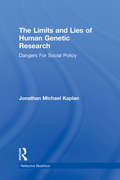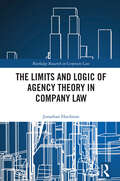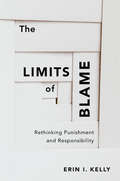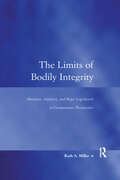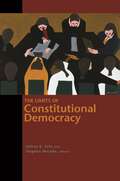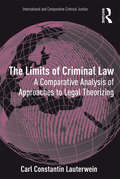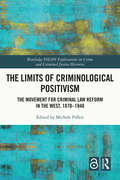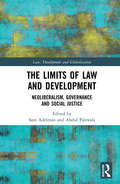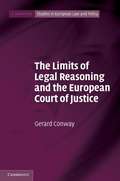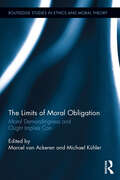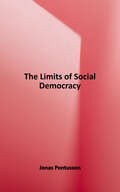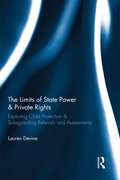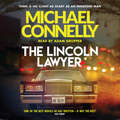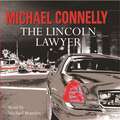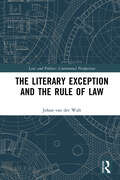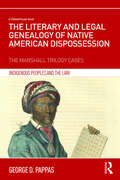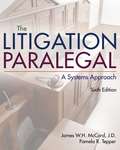- Table View
- List View
The Limited Liability Company
by Pamela Nollkamper Phillip JelsmaLLC Forms and Answers For guidance on efficiently forming and expertly advising LLCs, turn to James L. Leet, James Clarke, and Pamela Nollkamper's The Limited Liability Company. You will find the book and free Digital Access filled with practical advice, hundreds of reproducible forms, tax consideration, state-by-state analysis, and more: Forms * Pre-formation checklists; mandatory state articles of organization, with alternative provisions; state default rules; sample operating agreements, with opt-in features checklist and drafting outline; buy-sell agreements * Procedures and issues * Mandated articles of organization; filing procedures; all statutory requirements; and more... Now you can efficiently form LLCs custom-tailored to a variety of purposes, and provide quick answers to a wide range of client LLC questions with The Limited Liability Company. The Limited Liability Company provides complete materials for every state - all statutory requirements and forms: * Content permitted in articles of organization and operating agreements * Name reservation, filing and other formation procedures and fees Drafting checklists and digitized forms allow you to quickly create customized formation documents. Numerous alternative article provisions are also provided: management, committees, transfers, members, voting, notice, operating, arbitration, merger, share exchange, consolidation, and more. Also provided are model operating agreements and buy-sell agreements, both with alternate provisions and drafting outlines. Detailed Tax Guidance A comprehensive tax chapter addresses the most troublesome taxation issues you will encounter with LLCs. * Artful drafting can avoid many governance challenges, since many common LLC problems are both foreseeable and preventable. The Limited Liability Company provides drafting advice and alternate clauses to help avoid abuse by majority owners, operational deadlock, divorce of member, discharge of minority owners, unfair distribution of profits, withdrawal of members, mergers and acquisitions, and more. Key Issues and Procedures To help you traverse other difficult areas, The Limited Liability Company provides detailed discussions, step-by-step procedures, digitized forms, and citations to controlling authority. *
The Limits and Lies of Human Genetic Research: Dangers For Social Policy (Reflective Bioethics)
by Jonathan Michael KaplanIn The Limits and Lies of Human Genetic Research, Jonathan Kaplan weighs in on the controversial subject of the roles genes play in determining aspects of physical and behavioral human variation. Limits and Lies makes the case that neither the information we have on genes, nor on the environment, is sufficient to explain the complex variations among humans.
The Limits and Logic of Agency Theory in Company Law (Routledge Research in Corporate Law)
by Jonathan HardmanAgency theory is ubiquitous in company law. This book explores (a) the limits of such deployment, and (b) the logic of how to deploy it.The book makes five linked arguments in respect of the limits of agency theory in company law. First, it argues that agency theory has become so broad that it can be used to analyse most human relationships. Such breadth, though, comes at the expense of legal clarity: as agency relationships cover such a broad range of relationships, there are no normative legal conclusions that can be drawn merely from identifying such a relationship. Second, it argues that we need to differentiate more specific concepts with clearer legal implications, such as externalities, and the particular manifestation of moral hazard that appears in insurance dynamics. Third, it argues that considerable amounts of existing company law theory - which is ostensibly built from agency theory - is in fact based on a series of hidden value judgments at each stage of the analysis. Fourth, it argues that company law theory should use agency theory less to rebalance the discipline: agency theory has become hegemonic, which is dangerous for the discipline, obscures company law’s role in establishing incentives, undermines accountability, and reduces company law’s autonomy.The book then moves to the logic of agency theory and makes three arguments. First, it argues that we need to factor in the company, only apply agency theory to voluntary interactions, and foreground our value judgments when identifying agency relations to do it properly. Second, it argues that it is rational to incur agency costs when we perceive the benefits of doing so to outweigh the costs, meaning that agency costs can be facilitative and we should look to front-end them rather than universally minimise them. Third, it argues that this needs to be undertaken through mandatory laws.Exploring the external limits and internal logic of agency cost analysis, this book will be of interest to academics, students, and researchers of corporate and company law.
The Limits of Blame: Rethinking Punishment and Responsibility
by Erin I. KellyFaith in the power and righteousness of retribution has taken over the American criminal justice system. Approaching punishment and responsibility from a philosophical perspective, Erin Kelly challenges the moralism behind harsh treatment of criminal offenders and calls into question our society’s commitment to mass incarceration.
The Limits of Bodily Integrity: Abortion, Adultery, and Rape Legislation in Comparative Perspective (Law, Justice And Power Ser.)
by Ruth A. MillerThis volume argues that legislation on abortion, adultery, and rape has been central to the formation of the modern citizen. The author draws on rights literature, bio-political scholarship, and a gender-studies perspective as a foundation for rethinking the sovereign relationship. In approaching the politicization of reproductive space from this direction, the study resituates the role of rights and rights-granting within the sovereign relationship. A second theme running throughout the book explores the international implications of these arguments and addresses the role of abortion, adultery and rape legislation in constructing 'civilizational' relationships. In focusing on the Ottoman Empire, Turkey, France and Italy as case studies, Miller presents a discussion of what 'Europe' is, and the role of sexuality and reproduction in defining it.
The Limits of Constitutional Democracy (The University Center for Human Values Series #37)
by Stephen Macedo Jeffrey K. TulisConstitutional democracy is at once a flourishing idea filled with optimism and promise--and an enterprise fraught with limitations. Uncovering the reasons for this ambivalence, this book looks at the difficulties of constitutional democracy, and reexamines fundamental questions: What is constitutional democracy? When does it succeed or fail? Can constitutional democracies conduct war? Can they preserve their values and institutions while addressing new forms of global interdependence? The authors gathered here interrogate constitutional democracy's meaning in order to illuminate its future. The book examines key themes--the issues of constitutional failure; the problem of emergency power and whether constitutions should be suspended when emergencies arise; the dilemmas faced when constitutions provide and restrict executive power during wartime; and whether constitutions can adapt to such globalization challenges as immigration, religious resurgence, and nuclear arms proliferation. In addition to the editors, the contributors are Sotirios Barber, Joseph Bessette, Mark Brandon, Daniel Deudney, Christopher Eisgruber, James Fleming, William Harris II, Ran Hirschl, Gary Jacobsohn, Benjamin Kleinerman, Jan-Werner Müller, Kim Scheppele, Rogers Smith, Adrian Vermeule, and Mariah Zeisberg.
The Limits of Criminal Law: A Comparative Analysis of Approaches to Legal Theorizing (International And Comparative Criminal Justice Ser.)
by Carl Constantin LauterweinThis book compares the civil and common law approach to analyze the question - 'What sorts of conduct may the state legitimately make criminal?'. Through a comparative focus on an Australian and German context, this book utilizes interviews with Australian criminal law experts and contrasts them with the German model based on 'Rechtsgutstheorie'. By comparing the largely descriptive, criminology-based Australian approach with the more sophisticated German legal theory model the author finds the Australian approach to be suffering from a 'normative flaw', illustrated by the distinction of different approaches to the offences of incest, bestiality and possession of illicit drugs. Carl Constantin Lauterwein discovers that while there is strength in the common law approach of describing the possible reasons for criminalizing certain conduct, the approach could be significantly improved by scrutinizing the legitimacy of those reasons.
The Limits of Criminological Positivism: The Movement for Criminal Law Reform in the West, 1870-1940 (Routledge SOLON Explorations in Crime and Criminal Justice Histories)
by Michele PifferiThe Limits of Criminological Positivism: The Movement for Criminal Law Reform in the West, 1870-1940 presents the first major study of the limits of criminological positivism in the West and establishes the subject as a field of interest. The volume will explore those limits and bring to life the resulting doctrinal, procedural, and institutional compromises of the early twentieth century that might be said to have defined modern criminal justice administration. The book examines the topic not only in North America and western Europe, with essays on Italy, Germany, France, Spain, the United Kingdom, Belgium, and Finland but also the reception and implementation of positivist ideas in Brazil. In doing so, it explores three comparative elements: (1) the differing national experiences within the civil law world; (2) differences and similarities between civil law and common law regimes; and (3) some differences between the two leading common-law countries. It interrogates many key aspects of current penal systems, such as the impact of extra-legal scientific knowledge on criminal law, preventive detention, the ‘dual-track’ system with both traditional punishment and novel measures of security, the assessment of offenders’ dangerousness, juvenile justice, and the indeterminate sentence. As a result, this study contributes to a critical understanding of some inherent contradictions characterizing criminal justice in contemporary western societies. Written in a straight-forward and direct manner, this volume will be of great interest to academics and students researching historical criminology, philosophy, political science, and legal history.
The Limits of Freedom of Contract
by Michael J. TrebilcockOur legal system is committed to the idea that private markets and the law of contracts that supports them are the primary institutions for allocating goods and services in a modern economy. Yet the market paradigm, this book argues, leaves substantial room for challenge.
The Limits of Law and Development: Neoliberalism, Governance and Social Justice (Law, Development and Globalization)
by Abdul Paliwala Sam AdelmanThe book examines the well-established field of ‘law and development’ and asks whether the concept of development and discourses on law and development have outlived their usefulness.The contributors ask whether instead of these amorphous and contested concepts we should focus upon social injustices such as patriarchy, impoverishment, human rights violations, the exploitation of indigenous peoples, and global heating? If we abandoned the idea of development, would we end up adopting another, equally problematic term to replace a concept which, for all its flaws, serves as a commonly understood shorthand? The contributors analyse the links between conventional academic approaches to law and development, neoliberal governance and activism through historical and contemporary case studies.The book will be of interest to students and scholars of development, international law, international economic law, governance and politics and international relations.
The Limits of Legal Reasoning and the European Court of Justice
by Gerard ConwayThe European Court of Justice is widely acknowledged to have played a fundamental role in developing the constitutional law of the EU, having been the first to establish such key doctrines as direct effect, supremacy and parallelism in external relations. Traditionally, EU scholarship has praised the role of the ECJ, with more critical perspectives being given little voice in mainstream EU studies. From the standpoint of legal reasoning, Gerard Conway offers the first sustained critical assessment of how the ECJ engages in its function and offers a new argument as to how it should engage in legal reasoning. He also explains how different approaches to legal reasoning can fundamentally change the outcome of case law and how the constitutional values of the EU justify a different approach to the dominant method of the ECJ.
The Limits of Moral Obligation: Moral Demandingness and Ought Implies Can (Routledge Studies in Ethics and Moral Theory)
by Marcel Van Ackeren Michael KühlerThis volume responds to the growing interest in finding explanations for why moral claims may lose their validity based on what they ask of their addressees. Two main ideas relate to that question: the moral demandingness objection and the principle "ought implies can." Though both of these ideas can be understood to provide an answer to the same question, they have usually been discussed separately in the philosophical literature. The aim of this collection is to provide a focused and comprehensive discussion of these two ideas and the ways in which they relate to one another, and to take a closer look at the consequences for the limits of moral normativity in general. Chapters engage with contemporary discussions surrounding "ought implies can" as well as current debates on moral demandingness, and argue that applying the moral demandingness objection to the entire range of normative ethical theories also calls for an analysis of its (metaethical) presuppositions. The contributions to this volume are at the leading edge of ethical theory, and have implications for moral theorists, philosophers of action, and those working in metaethics, theoretical ethics and applied ethics.
The Limits of Parental Authority: Childhood Wellbeing as a Social Good (Routledge Annals of Bioethics)
by Johan C. BesterThis book offers a novel theory of childhood well-being as a social good. It re-examines our fundamental assumptions about parenting, parental authority, and a liberal society’s role in the raising of children. The author defends the idea that the good of a child is inexorably linked to the good of society. He identifies and critiques the problematic assumption that parenting is an extension of individual liberty and shows how we run into problems in medical decision-making for children because of this assumption. He develops an objective conception of what is good for a child in a liberal society, drawing on the assumptions of liberty, and from here constructs a set of things that society and its members owe children. There are ways in which society should support and intervene in parental decisions to guarantee a child’s well-being. Ultimately, raising children is a social activity that requires input from society. The author then applies this theory of childhood well-being to develop a framework for medical decision-making for children. He also uses practical examples, such as vaccinations, parental leave, and healthcare access, to demonstrate the implications of his theory for public policy. The Limits of Parental Authority: Childhood Wellbeing as a Social Good will be of interest to practitioners, scholars, and advanced students working in bioethics, political philosophy, and public health policy.
The Limits of Social Democracy: Investment Politics in Sweden (Cornell Studies in Political Economy)
by Jonas PontussonPontusson's book does an excellent job of taking a critical look at Swedish investment politics. . . . On the whole, this book is the best overall explanation of Swedish investment politics. It gives the reader a clear basis for understanding the rise of Swedish social democracy and provides a detailed examination of the developments of industrial policy, codetermination, and wage-earner funds.'--Contemporary Sociology.
The Limits of State Power & Private Rights: Exploring Child Protection & Safeguarding Referrals and Assessments
by Lauren DevineThis book tackles a complex area of law, social policy and social work, providing a comprehensive analysis of the theoretical, practical and legal boundaries of State power following safeguarding and child protection referrals in England. The book examines the history, rationale and implications of the current position, concluding that the balance of power is weighted in favour of the State. The Limits of State Power & Private Rights is ground-breaking in its approach to the subject and its detailed, critical analysis. Traditionally the subject matter of the book is considered within a welfare framework. The analysis in this book argues that a policing agenda is embedded within policy but without appropriate safeguards and controls, creating potentially irreconcilable tension described by the author as the ‘welfare/policing dichotomy’. This book is of importance to academics, lawyers, social workers, policy makers, practitioners and service users. The book is written so as to be accessible to a multi-disciplinary audience, but is sufficiently detailed so as to be suitable for specialists and non-specialists alike in this subject area. The chapters include introductory and contextual sections as well as doctrinal, theoretical and socio-legal analysis. Although the focus is on the English system, the book is equally applicable to the many worldwide jurisdictions adopting the Anglo/American ‘child rights’ based framework of child protection. It is also of use as a comparative work in countries where a family support based system is practiced.
The Limits of Transnational Law
by Guy S. Goodwin-Gill Hélène LambertState authority and power have become diffused in an increasingly globalised world characterised by the freer trans-border movement of people, objects and ideas. As a result, some international law scholars believe that a new world order is emerging based on a complex web of transnational networks. Such a transnational legal order requires sufficient dialogue between national courts. This book explores the prospects for such an order in the context of refugee law in Europe, focussing on the use of foreign law in refugee cases. Judicial practice is critically analysed in nine EU member states, with case studies revealing a mix of rational and cultural factors that lead judges to rarely use each others' decisions within the EU. Conclusions are drawn for the prospects of a Common European Asylum System and for international refugee law.
The Lincoln Lawyer: A Richard and Judy bestseller (Mickey Haller Series #1)
by Michael ConnellyThere is no client as scary as an innocent man...Mickey is a Lincoln Lawyer - a criminal defence attorney operating out of the back of his car, a Lincoln - taking whatever cases the system throws at him. He's been a defence lawyer for a long time, and he knows just how to work the legal system. When a Beverly Hills rich boy is arrested for brutally beating a woman, Haller gets his first high-paying client in years. The evidence mounts on the defence's side, and Haller might even be in the rare position of defending a client who is actually innocent.But then the case starts to fall apart. And neither the suspect nor the victim are quite who they seem, and Haller quickly discovers that when you swim with the sharks, you might just end up as prey...
The Lincoln Lawyer: A Richard and Judy bestseller (Mickey Haller Series #1)
by Michael ConnellyA major motion picture starring Matthew McConaughey. There is no client as scary as an innocent man. From the bestselling author of THE GODS OF GUILT and BRASS VERDICT comes the first in the Mickey Haller legal thrillers. Mickey is a Lincoln Lawyer, a criminal defence attorney who operates out of the back of his car, a Lincoln, taking whatever cases the system throws in his path. He's been a defence lawyer for a long time, and he knows just how to work the legal systems. When a Beverly Hills rich boy is arrested for brutally beating a woman, Haller has his first high-paying client in years. The evidence mounts on the defence's side, and Haller might even be in the rare position of defending a client who is actually innocent.But then the case starts to fall apart, neither the suspect nor the victim are quite who they seem - and Haller quickly discovers that when you swim with the sharks, it's easy to wind up as prey.
The Lincoln Lawyer: A Richard and Judy bestseller (Mickey Haller Series #1)
by Michael ConnellyA major motion picture starring Matthew McConaughey. There is no client as scary as an innocent man. From the bestselling author of THE GODS OF GUILT and BRASS VERDICT comes the first in the Mickey Haller legal thrillers. Mickey is a Lincoln Lawyer, a criminal defence attorney who operates out of the back of his car, a Lincoln, taking whatever cases the system throws in his path. He's been a defence lawyer for a long time, and he knows just how to work the legal systems. When a Beverly Hills rich boy is arrested for brutally beating a woman, Haller has his first high-paying client in years. The evidence mounts on the defence's side, and Haller might even be in the rare position of defending a client who is actually innocent.But then the case starts to fall apart, neither the suspect nor the victim are quite who they seem - and Haller quickly discovers that when you swim with the sharks, it's easy to wind up as prey.Read by Michael Brandon(p) 2005 Orion Publishing Group
The Lindbergh Kidnapping Suspect No. 1: The Man Who Got Away
by Lise PearlmanAstonishingly more key evidence is accessible today than was presented at the death penalty trial of Bruno Richard Hauptmann for the kidnap/murder of Charles Lindbergh, Jr. Viewing documents and photos that the jury never saw and forensic analysis never before published, you get to judge for yourself who committed the "crime of the century." Experts and enthusiasts alike are calling award-winning author Lise Pearlman's shocking new exposé on the Lindbergh kidnapping: "MYTH-SMASHING, BEAUTIFULLY WRITTEN, POWERFULLY ARGUED" — Lloyd Gardner "SHOCKING...WELL-DOCUMENTED…HIGHLY PLAUSIBLE.” — Dr. William M. Bass "EXPERTLY RESEARCHED" "SUPERBLY CRAFTED" "MUST-READ" — Greg Ahlgren & Stephen Monier This shocking but true story is told in just 350 pages divided into dozens of short, riveting chapters you can’t put down. Bonus features include: -- scores of photos including what Little Charlie really looked like at the time he disappeared and other suppressed evidence -- the May 1932 forensic report issued by the premiere medical lab now known as Bristol Myers Squibb. -- modern forensic analysis of the corpse by a renowned pathologist published here for the first time -- 60+ pages of detailed endnotes for armchair detectives and curious readers -- source list of over 90+ books, archives and other reference materials -- comprehensive index, and more! In the depths of the Depression, millions worldwide followed every twist and turn of the Lindbergh baby kidnap/murder. Yet what was reported was largely fake news. Nearly a century after undocumented immigrant Bruno Richard Hauptmann was executed for the dastardly crime, questions still linger. If the wrong man was convicted, who did it? When? Why? Where? How? The shocking answers this book suggests have eluded all prior authors. Extensive research into dusty archives yielded crucial forensic evidence never before analyzed. Readers are invited to reexamine "the crime of the century" with fresh eyes focused on a key suspect - a slim man wearing a fedora that obscured his face. He was spotted with a ladder in his car near the Lindberghs' driveway early that fateful night. The police let an insider who fit that description oversee the entire investigation - the boy's father, international hero Charles Lindbergh. Abuse of power, amorality and xenophobia all feature in this saga set in an era dominated by white supremacists and social Darwinists. If Lindbergh was Suspect No. 1, the man who got away, what was his motive? Who else was involved? Who helped cover up the crime? Read this book and judge for yourself.
The Line Through the Heart: Natural Law as Fact, Theory, and Sign of Contradiction
by J. BudziszewskiWhy do we demand happiness on terms that make happiness impossible? And what can we do about it? Acclaimed philosopher J. Budziszewski addresses these questions in the brilliantly persuasive book The Line Through the Heart, finding the answers in the natural law. The journey of exploration takes us through politics, religion, ethics, law, philosophy, and more, with Budziszewski as expert guide. While investigating the natural law and its implications, Budziszewski boldly confronts a wide range of contemporary issues, offering a newly integrated view of abortion, evolution, euthanasia, capital punishment, runaway courts, and the ersatz state religion built in the name of religious toleration. Written in Budziszewski's usual crystalline style, The Line Through the Heart shows that natural law is a matter of concern not merely to scholars but to everyone, for it touches how each of us lives, and how all of us live together. His profound examination of this subject helps us make sense of why habits that run against our nature have become second nature, and why our world seems to be going mad.
The Line through the Heart: Natural Law as Fact, Theory, and Sign of Contradiction
by J. BudziszewskiThe suicidal proclivity of our time, writes the acclaimed philosopher J. Budziszewski, is to deny the obvious. Our hearts are riddled with desires that oppose their deepest longings, because we demand to have happiness on terms that make happiness impossible. Why? And what can we do about it?Budziszewski addresses these vital questions in his brilliantly persuasive new book, The Line Through the Heart. The answers can be discovered in an exploration of natural law--a venture that, with Budziszewski as our expert guide, takes us through politics, religion, ethics, law, philosophy, and more.Natural law, the author states plainly but provocatively, is a fact about human beings; as surely as we have hands and feet, we have the foundational principles of good and evil woven into the fabric of our minds. From this elemental fact emerges a natural law theory that unfolds as part of a careful study of the human person. Thus, Budziszewski shows, natural law forms a common ground for humanity.But this common ground is slippery. While natural law is truly an observable part of human nature, human beings are hell-bent--quite literally--on ignoring it. The mere mention of the obligations imposed on man by his nature will send him into a rage. In this sense, The Line Through the Heart explores natural law as not simply a fact and a theory but also a sign of contradiction.While investigating the natural law and its implications, Budziszewski boldly confronts--and offers a newly integrated view of--a wide range of contemporary issues, including abortion, evolution, euthanasia, capital punishment, the courts, and the ersatz state religion being built in the name of religious toleration.Written in Budziszewski's usual crystalline style, The Line Through the Heart makes clear that natural law is a matter of concern not merely to scholars; it touches how each of us lives, and how all of us live together. His profoundly important examination of this subject helps us make sense of why habits that run against our nature have become second nature, and why our world seems to be going mad.
The Literary Exception and the Rule of Law (Law and Politics)
by Johan Van Der WaltAddressing the influential analysis of law and literature, this book offers a new perspective on their relationship. The law and literature movement that has gained global prominence in the course of last decades of the twentieth and the first decades of the twenty-first centuries has provided the research and teaching of law with a considerable body of new and valuable knowledge and understanding. Most of the knowledge and insights generated by the movement concern either a thematic overlap between legal and literary discourses – suggesting they deal with the same moral concerns – or a rhetorical, semiotic or general linguistic comparability or ‘sameness’ between them – imputing to both the same or very similar narrative structures. The Literary Exception and the Rule of Law recognises the wealth of knowledge generated by this approach to the relationship between law and literature, and acknowledges its debt to this genre of scholarship. It nevertheless also proposes, on the basis of a number of revealing phenomenological inquiries, a different approach to law and literary studies: one that emphasises the irreducible difference between law and literature. It does so with the firm believe that a regard for the very different and indeed opposite discursive trajectories of legal and literary language allows for a more profound understanding of the unique and indeed separate roles that the discourses of law and literature generally play in the sustenance of relatively stable legal cultures. This important rethinking of the relationship between law and literature will appeal to scholars and students of legal theory, jurisprudence, philosophy, politics and literary theory.
The Literary and Legal Genealogy of Native American Dispossession: The Marshall Trilogy Cases (Indigenous Peoples and the Law)
by George D PappasThe Literary and Legal Genealogy of Native American Dispossession offers a unique interpretation of how literary and public discourses influenced three U.S. Supreme Court Rulings written by Chief Justice John Marshall with respect to Native Americans. These cases, Johnson v. M’Intosh (1823), Cherokee Nation v. Georgia (1831) and Worcester v. Georgia (1832), collectively known as the Marshall Trilogy, have formed the legal basis for the dispossession of indigenous populations throughout the Commonwealth. The Trilogy cases are usually approached as ‘pure’ legal judgments. This book maintains, however, that it was the literary and public discourses from the early sixteenth through to the early nineteenth centuries that established a discursive tradition which, in part, transformed the American Indians from owners to ‘mere occupants’ of their land. Exploring the literary genesis of Marshall’s judgments, George Pappas draws on the work of Michel Foucault, Edward Said and Homi Bhabha, to analyse how these formative U.S. Supreme Court rulings blurred the distinction between literature and law.
The Litigation Paralegal: A Systems Approach
by James W. H. McCord Pamela TepperCombining theories and principles of law with practical skills, this engaging, highly visual text includes numerous forms, checklists, and online resources in the context of the law office. The book covers the latest electronic discovery issues and the associated ethical and practical responsibilities of the paralegal. It also includes a wide range of new and updated cases, practical tips, assignments, key terms, and study questions to help you master the content.

